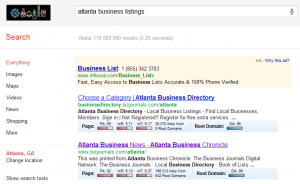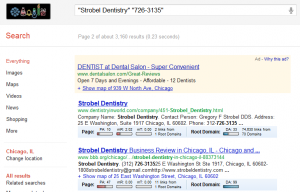Where To Get Citations For Local SEO
If you haven’t heard, local SEO is taking over. More than 20 percent of Google searches are for a local business. That number doubles on mobile devices, and it’s starting to show in the SERPs. When was the last time you searched and got only the traditional 10 organic listings? SERPs are being inundated with […]
If you haven’t heard, local SEO is taking over. More than 20 percent of Google searches are for a local business. That number doubles on mobile devices, and it’s starting to show in the SERPs. When was the last time you searched and got only the traditional 10 organic listings? SERPs are being inundated with images, videos, rich snippets and above all, local listings, and these are exactly where consumers are navigating to.
Recently captured eye-tracking data for Google searches found that users are gravitating toward the Google Places listings over the organic listings, whether it’s the 7-pack or mixed with natural listings, as noted by the heat map below.
![]()
Google likes to make things tricky, and since it’d be too easy to have the same algorithm for Google Places and organic listings, you’re playing in an entirely different ballgame with local SEO. It should go without saying that you need a Google Places page to get ranked in local listings. Once it’s set up and optimized with exact categories, pictures and videos, the real fun begins: getting citations.
Citations are for local SEO as what links are for natural listings. The more places your business information is listed consistently, the easier search engines can find your business, and the better your local rankings will be. So, where do you get those citations?
Join The Aggregators
People don’t just rely on search engines to find local businesses. There are hundreds of local directories that that people use to search, and you should get a page set up on each. Not only will it help your local SEO, but it also gives another way for people to find you. Each industry will have its own set of aggregators, and doing a search for “City + industry” will help you find your options.
Here’s a list of the biggest general ones that you need to be listed in:
- Yelp
- Superpages
- City Search
- Urban Spoon and OpenTable (for restaurants)
- Yellow Pages
- Angie’s List
- Express Update USA (formally infoUSA)
- Yahoo Local
- Trip Advisor
- Merchant Circle
- Dex Knows
- Insider Pages
- Localeze
- Shop City
- Judy’s Book
- Yellow Bot
- Kudzo
Search For Your Competitors
You should always check to see what your competition is doing, and for local SEO, you want to find where they’re listed. Searching for their business name and phone number in quotation marks will bring you additional places that you can also list your business information.
Searching without the area code typically brings up more localized places. You can also search the business name with the address and city name. You’ll likely need to click through a couple of pages in Google since the first page will be results related to that business specifically.
Social Media & Local Blogs
Local bloggers also typically have a local business/vendors page that typically list places in their area. Searching for your city name + blog should be your first starting point.
You can also narrow down the results some by adding in your industry: If you’re a restaurant, search for city name + food blogs. Blogs.com and Networked Blogs are also good places to start looking for local blogs in your area.
Finally, search for the national blogs that have a local counter part. For example, The Knot has a local vendor database where you can put your business information if you provide any wedding services, like venues, catering, hair salons, florists, DJs, and transportation. Other options include Patch, The Business Journals, GalTime and BlogHer.
Local Directories & Newspapers
If people are looking for a local business, they don’t just look to search engines. Local newspapers and local directories are an easy way to grab a citation, and these typically have a higher value since they’re focused only on one area.
If you host events, submit them to your local newspapers’ calendar listing. Some local newspapers will also have a business listing database that you can submit your information to.
Search for “city name + business listings” and “city name + directory” to find more results. With these searches, you’ll likely also see PPC ads of additional places to get listed.
Again, putting in your industry will also narrow down results, and you can also just search for your industry, IE “dentist directories” or “Atlanta dentist listings.” And don’t forget your city’s chamber of commerce website.

Whitespark has also created a local citation finder that does much of the leg work for you — for a price, of course, but they do have limited free version available. The most important thing to remember is consistency is key. For example, if you have “Street” on your Places page, make sure it’s “Street”, not “St.”, across all citations as well.
Contributing authors are invited to create content for Search Engine Land and are chosen for their expertise and contribution to the search community. Our contributors work under the oversight of the editorial staff and contributions are checked for quality and relevance to our readers. The opinions they express are their own.
Related stories
New on Search Engine Land
